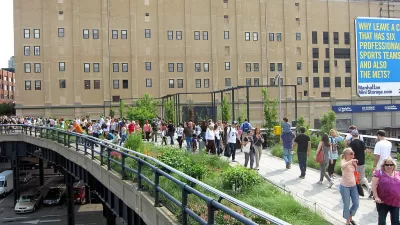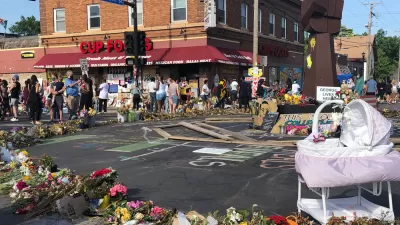A growing body of research examines the question of how to make places more attractive and healthy, without then making them more expensive.

Rebecca Tuhus-Dubrow provides access into an ongoing debate about "environmental gentrification": "Low-income communities tend to suffer from various kinds of environmental injustice, including shortage of green space. But when these concerns are addressed — the power plant closes, a park opens — the neighborhood becomes more desirable, often kickstarting a process of so-called 'environmental gentrification.'"
Researchers and advocates have proposed a "just green enough" model that "seeks to remedy injustices without introducing the fancy amenities that can radically transform a neighborhood," according to Tuhus-Dubrow.
The approach is the subject of a new paper in the journal Landscape and Urban Planning, by University of California, Berkeley professor Jennifer Wolch and coauthors.
The paper concludes with recommendations for pulling off the “careful balancing act” of improving conditions without inducing environmental gentrification, including:
- "Planners must be willing to design projects determined by specific community needs and preferences."
- "…prioritize small and scattered parks and community gardens, which can distribute access throughout a neighborhood, rather than flashy, large-scale projects of the type that tend to attract attention and real estate speculation."
FULL STORY: Pretty Park, Affordable Rent: Making Neighborhoods “Just Green Enough”

Maui's Vacation Rental Debate Turns Ugly
Verbal attacks, misinformation campaigns and fistfights plague a high-stakes debate to convert thousands of vacation rentals into long-term housing.

Planetizen Federal Action Tracker
A weekly monitor of how Trump’s orders and actions are impacting planners and planning in America.

Chicago’s Ghost Rails
Just beneath the surface of the modern city lie the remnants of its expansive early 20th-century streetcar system.

Bend, Oregon Zoning Reforms Prioritize Small-Scale Housing
The city altered its zoning code to allow multi-family housing and eliminated parking mandates citywide.

Amtrak Cutting Jobs, Funding to High-Speed Rail
The agency plans to cut 10 percent of its workforce and has confirmed it will not fund new high-speed rail projects.

LA Denies Basic Services to Unhoused Residents
The city has repeatedly failed to respond to requests for trash pickup at encampment sites, and eliminated a program that provided mobile showers and toilets.
Urban Design for Planners 1: Software Tools
This six-course series explores essential urban design concepts using open source software and equips planners with the tools they need to participate fully in the urban design process.
Planning for Universal Design
Learn the tools for implementing Universal Design in planning regulations.
planning NEXT
Appalachian Highlands Housing Partners
Mpact (founded as Rail~Volution)
City of Camden Redevelopment Agency
City of Astoria
City of Portland
City of Laramie




























